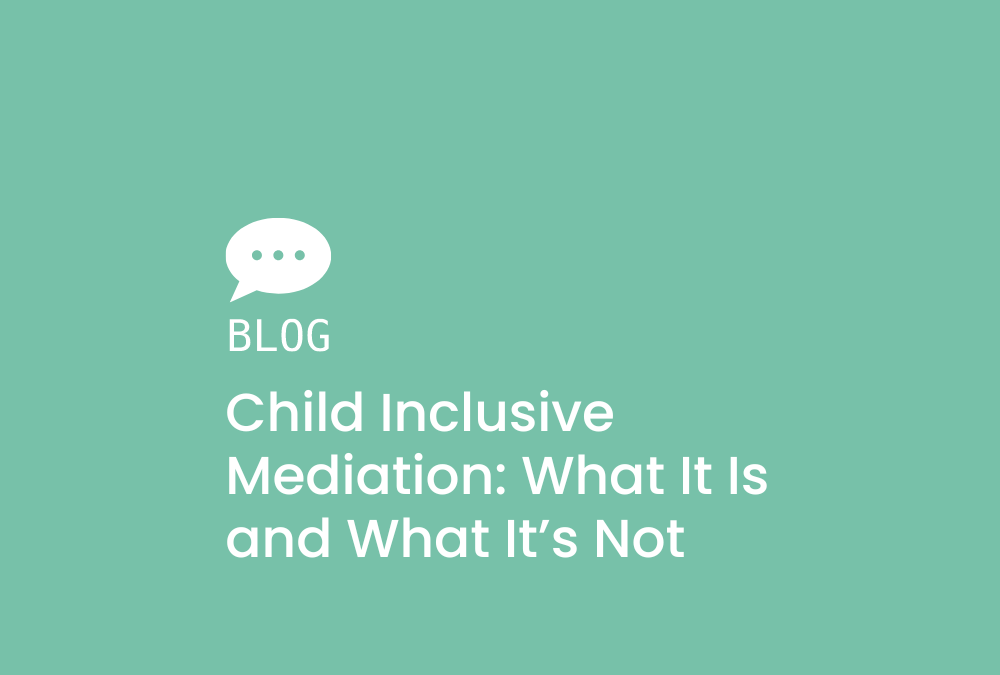Child inclusive mediation (formerly direct child consultation) is not a new practice within family mediation however it has gained some momentum over the last few years.
At Consilia, we’re noticing an increase in enquiries about child inclusive mediation (CIM) from solicitors, the Family Court and participants themselves. There are some common questions we receive about the process and also some misconceptions about CIM which we aim to clarify before the process is underway.
In this blog, I aim to answer those common questions, dispel some myths and provide clarity on what CIM is and what it isn’t which will hopefully help those considering CIM to understand whether it is an appropriate process for what they are hoping to achieve.
CIM is voluntary for all involved
One of the most important principles of CIM, if not the most important, is that it is a voluntary process for all involved. This means that the following individuals must be willing for a child to be seen by a qualified CIM mediator:
- The adult participants to the mediation (most commonly the parents);
- The child/children concerned;
- The mediator.
If and only if all of the above individuals consent to the child being seen by the mediator will CIM take place.
CIM cannot be ordered by the Court
In accordance with the voluntary nature of CIM above, it is important to point out that whilst the Court can encourage parties within Children Act Proceedings to consider whether CIM is an appropriate process for their case, the Court cannot order CIM to take place. Even if the case is within proceedings, CIM remains voluntary for all involved.
There is no written report
One common misconception about CIM is that after the mediator has met with the child, he/she will produce a written report of the discussions with the child which is made available to the parents, solicitors and/or the Court.
I cannot emphasise strongly enough that this is not the case. There is no written record of the discussions between the mediator and the child. Any discussions which the child wishes the mediator to feedback to the parents remains confidential within the mediation process and is relayed to the parents verbally only.
The mediator cannot be ordered to produce a written report and if any mediator were to provide such a report they would be directly in breach of the Family Mediation Council Professional Standards and Self-Regulatory Framework.
The Mediator does not provide formal recommendations
The purpose of CIM is to give a child a voice within the mediation process so that they have the opportunity to express how they feel about their own situation and any ideas they may want to share with their parents. By relaying this information to the parents with the child’s consent, the parents may be given insight into the views of the child and they can then consider how this impacts upon their decision making in mediation or otherwise.
It is not for the mediator to tell the parents what they should do with the information they have received from the child. The mediator will facilitate discussions with the parents after feeding back the child’s views, may explore any relevant signposting services and will encourage the participants to find a resolution but the mediator will not make any formal recommendations.
CIM is for the child
It is important for those referring CIM to understand that the primary purpose of the process is to give a child a voice. It is therefore hoped that the process of the child speaking with the mediator will have benefits for the child which could include:
- Having someone to talk to who is not mum or dad;
- Feeling a weight being lifted from having shared their feelings;
- Knowing their parents will hear their views through someone else;
- Feeling listened to;
- Not feeling ignored or like their views do not matter;
- Feeling more positive about their situation and/or their future.
Whilst a secondary outcome of CIM may be that the parents gain insight into their child’s views and this forms part of their decision making, this is not the primary purpose. As explained above, the primary purpose is that the child feels the process has benefited them, not the parents.
CIM should therefore not be embarked upon to serve the parent’s own interests including to act as evidence to support their case in any contested proceedings.
If you would like to know more about the process of CIM or make a referral, please contact our mediation team at enquiries@consiliamediation.co.uk or on 0113 322 9222.

